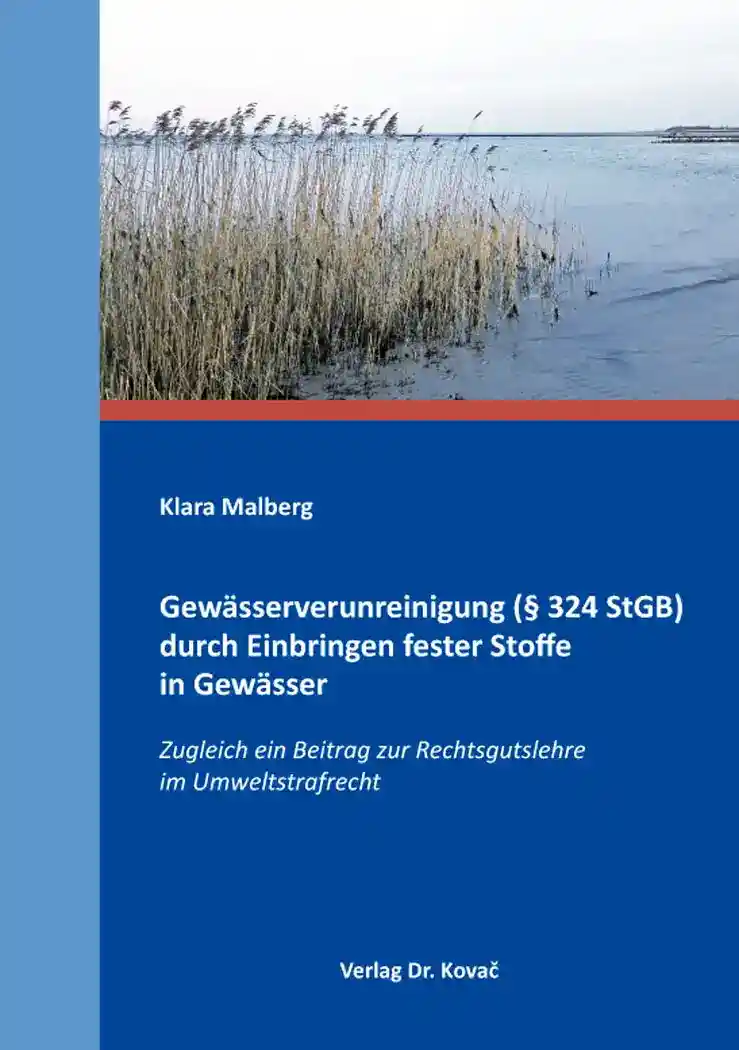Klara MalbergGewässerverunreinigung (§ 324 StGB) durch Einbringen fester Stoffe in Gewässer
Zugleich ein Beitrag zur Rechtsgutslehre im Umweltstrafrecht
Strafrecht in Forschung und Praxis, volume 364
Hamburg 2018, 322 pages
ISBN 978-3-339-10460-1 (print) |ISBN 978-3-339-10461-8 (eBook)
About this book deutschenglish
For almost four decades, the criminal offence of water pollution has been enshrined in § 324 StGB. After the initially lively discussions about the norm have ebbed away, many detailed questions about the elements of the offence remain unresolved. These are the questions that Klara Malberg addresses in her work „Gewässerverunreinigung (§ 324 StGB) durch Einbringen fester Stoffe in Gewässer – Zugleich ein Beitrag zur Rechtsgutslehre im Umweltstrafrecht“.
Prefixed is a representation of the object water body. In addition, the conditions for the intervention of German penal authorities in the case of affected waters outside of German territory are explained.
A comprehensive examination of the legal interest serves as a basis for the interpretation of further elements of the offence. Klara Malberg first explains the functions of legal interests; then she presents the theories brought forward for § 324 StGB and explains why in her opinion the ecological-anthropocentric determination is more coherent than a purely anthropocentric, purely ecological or administratively oriented one.
In addition, the prerequisites for the success of the crime is clearly presented and explained. Water characteristics („Gewässereigenschaften”) protected by § 324 StGB include all ecological functions of the water body. While the element of change („Verändern“) merely means objectively deviating from the previous status quo, the element of disadvantage („Nachteilhaftigkeit“) leaves room for evaluations. In the light of the ecological-anthropocentric determination of the legal interest, impairments of human interests in water use must also be taken into account.
Subsequently, (ecological) effects and criminal treatment of water impacts caused by the insertion of solid substances are illustrated by model cases. It is shown that the insertion of so-called inert substances, which do not dissolve, decompose or change the state of aggregation in water, can amount to the statutory definition of water pollution (§ 324 StGB) in many ways. However, if, in the context of the disadvantageousness, the sole focus is on the impairment of human interests in water use, conflicts of interest may arise between water protection and water exploitation; in these cases, a restriction of the success of the crime is proposed.
Keywords
EigenschaftsveränderungGewässerGewässereigenschaftenGewässernutzungGewässerverunreinigungNachteilhaftigkeitNutzungsbeeinträchtigungÖkologisch-anthropozentrische RechtsgutsbestimmungRechtsgutslehreRechtswissenschaftStrafrechtUmweltstrafrechtVerunreinigung§ 324 StGBIhr Werk im Verlag Dr. Kovač

Möchten Sie Ihre wissenschaftliche Arbeit publizieren? Erfahren Sie mehr über unsere günstigen Konditionen und unseren Service für Autorinnen und Autoren.
